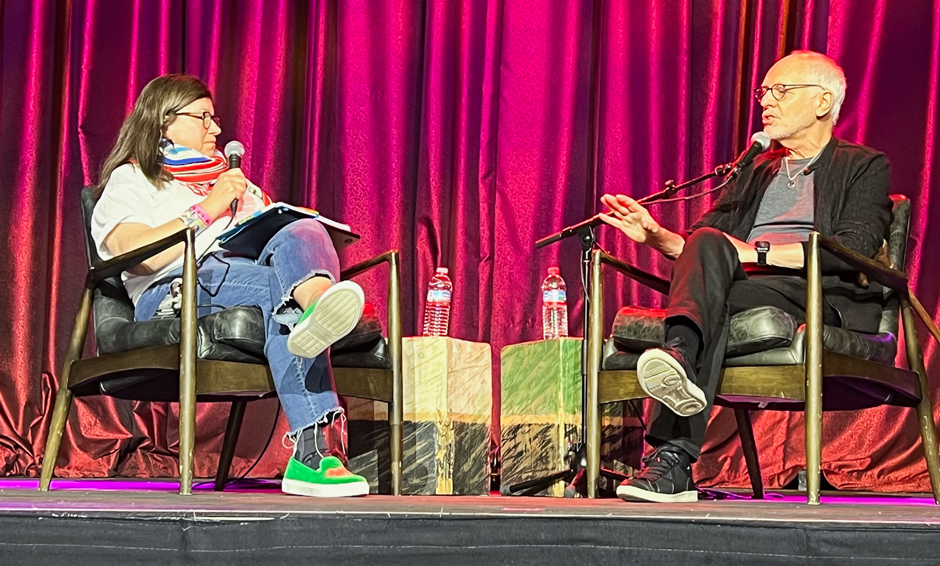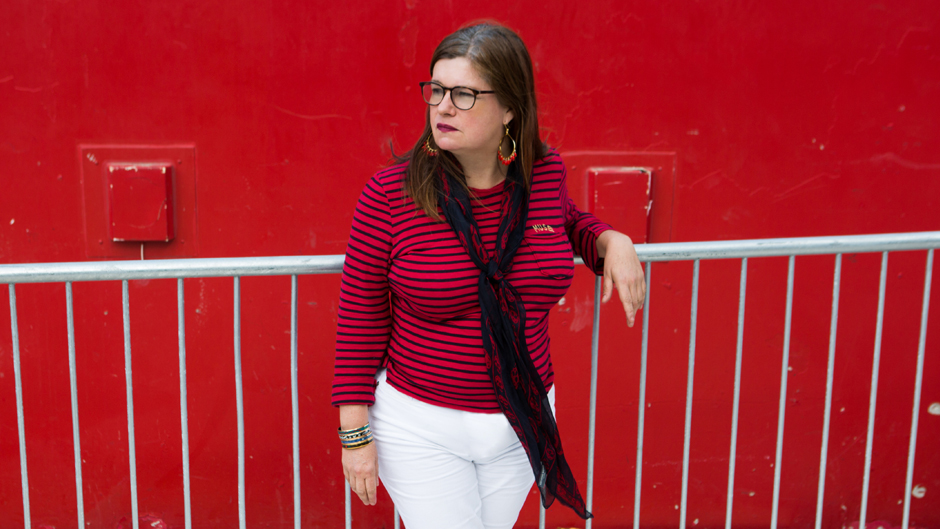Holly Gleason was but a quirky 18-year-old young adult when she started her communication studies at the University of Miami, yet the precocious storyteller had already published articles in major magazines and dailies.
Gleason was smitten early by the media bug, having given her first interview as a 5-year-old golfing prodigy. And as a budding writer growing up in Cleveland, Ohio, she often slipped into bars even as a teenager, not to drink, but instead drawn by her fascination for music and to meet those who made it and played it and to tell their stories.
At the University, she followed her father’s advice to eschew journalism studies— “Honey, you know all about this, you’ve been around it your whole life,” he’d said—and focused instead on learning the business and legal disciplines of communication.
“The broadcasting major that I studied was certainly far more than knowing about frequency and amplitude modulation,” recalled Gleason, who earned her B.A. in 1985. “They showed you the business of it and made the education fluid enough so that it made the knowledge dynamic.”
Gleason credited her learning at the University with honing the facilities she utilized to write for Rolling Stone, Spin, Playboy, the Los Angeles Times, the Miami Herald; earn accolades such as “Entertainment Journalist of the Year”; and to author and edit a number of books.
“The program made me really mindful of who I’m writing for and to believe in the audience. I had learned some of that as a kid, but UM made it a workable reality,” she said. “One of the reasons I was able to slide in and out of all the different places that I did was because I knew how you stratify a market, how you recognize all the different ways you can realize who’s reading, and that when you break it down as more than just numbers, you start to see people.”

Holly Gleason interviews musician Peter Frampton at the Relix Music Conference in Nashville in April. Photo: Courtesy of Lynn Goldsmith
Gleason’s father dreamed of becoming a writer. Instead, he fashioned a career as an expert on country club and golf liability, which meant copious time spent around golf courses. For his daughter, he crafted a different dream: for her to become “the brave new face of women’s amateur golf.”
“I did become a championship golfer, though I wasn’t as good as my hype,” she said laughing. “I had little pig tails, was very funny, wore my emotions on my sleeve, and I could talk to grown-ups like a grown-up. And I understood how to be gracious and nice to the members and tell them how fabulous their club was.”
Gleason didn’t just play golf. She wrote about it, too, penning articles about golf in local publications and writing often for a newsletter meant to attract young women golfers to the game. When she became the first woman to caddy in a major U.S. Golf Association event, she wrote the lead essay on her experience for a major golf publication.
But the “swish-click” of club to ball was not the only music Gleason was hearing.
“Music did multiple things for me: I wanted to be with the cool kids—the kids at the golf shop—so I hung out and listened to a lot of music; heard people talk about music; and developed a love for music, though I didn’t exactly understand all that it was,” she noted.
An epiphanic moment came when her “super cool hippie babysitter” had a spat with her boyfriend and took Gleason with her to a Rolling Stones concert instead.
“I was just 12 or so and, wow, seeing Keith Richards on the Jumbotron or whatever they called it back then was amazing. He was so scary and beautiful and delicious,” Gleason exclaimed.
Disappointed that she wasn’t offered a golf scholarship to an Ohio college, she followed her dad to Florida where he had relocated because of his failing health and enrolled at Rollins College with the hopes of playing golf there.
While in college, Gleason befriended Craig Fuller, the lead singer for Pure Prairie League, a popular country rock band that was on tour nearby. She interviewed him for the school newspaper while they both played a round of golf.
“You should think about writing about music,” Fuller suggested.
“Yeah, right. No one’s going to take me seriously, Gleason replied.
Fuller’s advice proved prophetic.
After a year at Rollins College, Gleason transferred to the University of Miami to be closer to her father, who had moved to Palm Beach.
Soon after enrolling, she met Glen Hutton, then the general manager of WVUM. He made her a deal that if she would come to summer school and open up the station every day, he’d give her a regular show once school started in the fall.
“It was perfect,” she said. “I didn’t have to stay home with my father for the summer and the campus was slower. I’m dyslexic, so I could figure out how to navigate campus and get to class on time.”
Gleason worked the night shift managing the switchboard at The Mutiny Hotel in Coconut Grove and began freelancing, which paid well at the time, in earnest to cover her tuition and living.
Often living on 99-cent plates of rice and beans, the free breakfast served at her night job, Pay Day candy bars—“they had real peanut butter”—and the generosity of faculty members who, as part of a “conferencing” session, paid for her lunch, Gleason scraped by.
Capitalizing on her contacts and expansive understanding of music, she wrote about rock and roll and punk music for The Hurricane and the Grapevine in the Grove, R&B and soul for The Miami Times, but it was the country music scene where she really earned her stripes as a music critic.
At the time, the Miami Herald had no one to cover the exploding country scene. And after multiple attempts to convince the paper’s editors to give her a shot, one editor tagged her as “this kid at UM who writes about country music” to one of the newspaper’s decision makers, and she finally got her break. And Gleason didn’t disappoint. She ended up covering a wide slate of artists for the newspaper which had a circulation at the time that hovered near a million.
Gleason credits Jack Metzger, the first faculty advisor of WVUM and a University instructor for 14 years, with guiding her career direction.
“I was in the middle of my junior year and still thought that I might want to be in radio, but Jack warned me about the impact that deregulation would have on the field,” she said. “‘If you’re not ahead of the curve, you’re going to end up on the wrong side of First Amendment lawsuits for the rest of your life,’ he warned me,” she said.
Metzger had read her stories in the Miami Herald and told her she was as good as anybody writing for Rolling Stone magazine. “You should really treat this like something more than just your part-time job bagging groceries,” he told her.
“I had never thought of writing about music as a career. I was a good writer and if I could, I’d have written about something else, except that I didn’t have the passion for other things,” Gleason said.
Metzger told her to give that career two years. Within that time frame, she managed to interview some of the biggest names in the business—Johnny Cash, Dolly Parton, Waylon Jennings, Jimmy Buffett, John Prine (“Prine on Prine: Interviews and Encounters with John Prine” with Gleason as the editor has just been published) among scores of others.
After a few years, Gleason left journalism to work at a record company.
“I didn’t like the way they made the sausage and thought I could make a difference on the inside. But I found out you can’t because there’s too much politics and too many compromises,” she said. She moved on to launch an independent artists development company called Joe’s Garage Publicity, which she managed for 13 years.
A few years ago, she returned to school to complete an M.F.A. at Spalding College in Louisville, Kentucky. The program served as a realization that her writing needed to go to another level.
“It really taught me to refocus and how to bear down and not be afraid to take the point all the way to the hoop,” Gleason said. “It also reminded me that I was put here to do something bigger.”
On completing her M.F.A., Gleason earned a book contract and wrote “Woman Walk the Line: How the Women in Country Music Changed Our Lives,” which garnered the 2018 Belmont Book Award for the best book on country music.
“I was a freakishly good writer as a child, and I learned along the way that if you’re given a gift, it’s your job to marshal it forward,” Gleason said. “I’ve been told that I give people the truth of their lives that they might not find otherwise. I found the emotional and clarity of my life in peoples’ songs, that’s true.”

